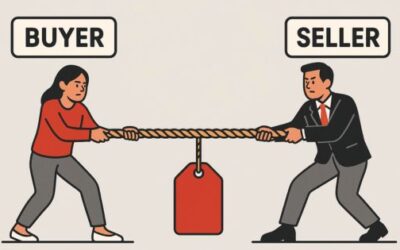Strategies for Discovery Call Prep
Discovery calls are the lifeblood of a sales professional’s success. There’s a reason every guru and influencer hammers on the importance of a discovery. Discovery calls are when you step into the prospect’s shoes, immerse yourself in their world, and start the journey towards a meaningful partnership. Without a proper discovery you, as a salesperson, can’t properly understand the buyer’s environment and therefore cannot make a proper recommendation. Mastering discovery starts with mastering the preparation for each call.
What is a discovery call?
At the heart of every successful sale lies the discovery call. This integral step can make or break your sales efforts. Why is it so pivotal?
This is potentially your one and only opportunity to understand the buyer’s world. You’re stepping into their shoes, seeing their business and it’s landscape through their eyes, and experiencing their challenges firsthand. To do this effectively, you must achieve 3 fundamental objectives.
Begin you sales discovery process by grasping their current situation. Start by gaining insights into their organization’s current state, the processes they follow, the problems or challenges they are facing, how those problems are affecting the business.
Secondly, you need to understand their emotional state as it relates to where they are. How do they feel about where they are, how do they feel about their challenges, what is motivating them to seek change?
Thirdly, discuss where they want to go. What are their desired outcomes, what are the goals and objectives they are trying to achieve, why are they unable to reach those goals with their current processes?
A discovery call’s purpose is to paint a vivid, multi-dimensional picture or your prospect’s reality. The more you know about their world, the stronger the recommendation and your ability to help becomes.
Preparing for a Discovery Call
Before you start dialing, there’s a significant step you need to take that separates success from failure and that is research. Researching a prospect is the key piece of discovery call prep. We need to arms ourselves with knowledge about the buyer, their role, and their company. Pre-discovery research is what transforms sellers from a salesperson to a consultant.
You wouldn’t travel to a foreign country without a map, understanding of local cultures, or where you want to go, would you? Of course not. Why would you do that with a discovery call?
Research allows you to tailor questions to the buyer based on assumptions. Rather than asking generic questions “why do you want to change” or “what’s the impact of that problem” you should aim to already know those answers OR have a route planned to get you to that information. You should be so well-informed about their current state, processes, and challenges that you can ask questions that guide the conversation to the answers you need.
Selling is about being a business analyst – uncovering hidden challenges and weaknesses in a buyer’s current process. You’re not selling a product, you’re offering a solution to a specific problem.
Research Your Prospect on LinkedIn
Before every call you should be scouring the buyer’s online profiles, specifically LinkedIn. Learn everything you can about this person and their role. Are they asking questions? Are they looking for advice on specific issues? Use their profile as a starting point. Think back on previous relationships and sales. Have you sold to a company in a similar space? Have you sold to a person in a similar role? Can you anticipate or expect this new prospect to have similar problems to someone you’ve worked with in the past? If this prospect falls into your ICP there is bound to be similarities to a previous client. Use those similarities to your advantage.
Understand the Buyer’s Industry
Once you have a good handle on the person you’re talking to, it’s time to dig into the broader context in which they operate. What are the current trends, emerging technologies, and market dynamics of their industry? Are there new competitors on the scene? Has the consumer preference shifted? Speak the industry language fluently. Would you trust the salesperson at the home improvement store who didn’t understand the difference between a flat head and a Phillips head screwdriver? No, so why would a buyer trust you if you don’t understand their industry?
Are There External Factors in the Buyer’s World?
External factors can throw a wrench into the gears of any business without a moment’s notice. Changes in regulations, shifts in the economic climate, or emergences of disruptive technologies can be panic inducing for a buyer. You should be able to identify these external factors if they are relevant to your product or service and demonstrate how you can mitigate or minimize their effect.
Asking Sales Questions with Purpose
The whole point of this extensive research is to give yourself the opportunity to craft sales discovery questions with a specific purpose in mind. It is NOT a set script, it’s more about tailoring your approach and inquiries to gather the pieces of information you need.
Each question should be designed to elicit a particular piece of information, validate a hypothesis, or guide the conversation in a strategic direction.
Open-ended Sales Questions
There’s been a long standing argument that salespeople should avoid asking yes or no questions discovery call questions. That’s not entirely good advice. Open-ended questions can help to encourage the prospect to share their thoughts, experiences, and challenges, BUT, yes or no questions can be a great way to anchor a buyer. Don’t trap yourself by only asking yes/no questions or open ended questions but be mindful that too many one word answers from a buyer can limit the effectiveness of your discovery.
Fluid Discovery Call Questioning Framework
Your discovery questions strategy should be fluid, adapting to the information you uncover during the call. As you learn more about the prospect’s situation, you can adjust your questions to delve deeper in specific areas of interest. Use what you learned in your research to craft your framework. Take the assumptions you made based on the research and the comparisons to other similar company / job title profiles and validate them with your questioning. If you believe the prospect is or could be struggling with a particular process then ask “Can you tell me more about your experience with (process)?”
As you begin to rack up some numbers, don’t be afraid to go back and assess your previous calls. Which questions worked, which questions didn’t work? Is there a way to ask a question differently to get to a specific piece of information more efficiently or effectively? Could you have researched deeper to formulate a more relevant question?
Preparing for discovery calls is a vital practice for a salesperson. Honing your discovery call skillset can be a giant differentiator for you as your sales career progresses.





0 Comments